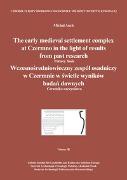The early medieval settlement complex at Czermno in the light of results from past research.Wczesnosredniowieczny zespól osadniczy w Czermnie w swietle wyników badan dawnych
BücherAngebote / Angebote:
Presented book brings forward research papers dedicated to the hillfort at Czermno, on Poland's eastern border, identified at present as the remains of the early medieval city of Cherven', a major site on the Polish-Ruthenian borderland in the 10th-13th centuries. The following book discusses the issues of chronology, production techniques and stylistic features of clay vessels, fragments of which are the most numerous among finds acquired during archaeological fieldwork held in Czermno in the years 1940, 1952, 1976-1979. The monograph is a continuation of the publication from 2016, dedicated to the other categories of finds from the past research in Czermno. The book provides a detailed analysis of technological, formal and stylistic features of vessels manufactured and utilized in the early medieval settlement complex. The Author discusses chronology of technological and stylistic shifts in the pottery production, he also attempts to indicate stylistic influences of pottery-making traditions from both the early Piast state and Kievan Rus'. The results of physicochemical analyses of pottery fabrics as well as radiocarbon datings of organic residues preserved on vessels walls form indispensable complements to the conclusions. Individual analyses are the result of an international cooperation of researchers from Poland, Germany, Russia, Serbia and Ukraine pursued within two wide-scale projects: The Golden Apple of Polish archaeology. Stronghold complexes at Czermno and Gródek (Cherven' Towns) - chronology and function in the light of past and current research (Ministry of Science and Higher Education, Warsaw/Poland, National Programme for the Development of the Humanities, project No. 12H 12 0064 81), and The Elbe Marches, Poland and Bohemia from the 10th to the 12th century (Federal Ministry of Education and Research, Bonn/Germany, project No. FKZ 01UG1410).
Folgt in ca. 2-3 Arbeitstagen




